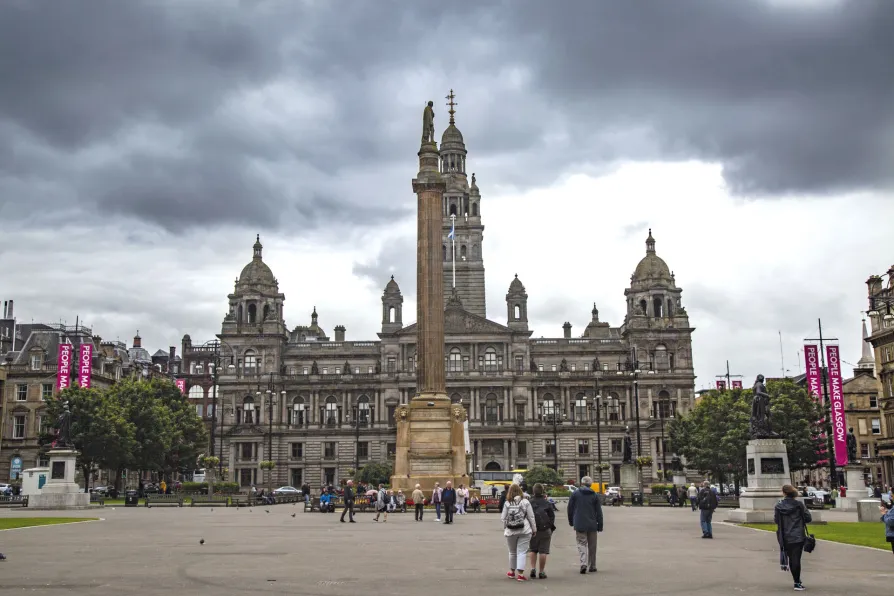The work done by Glasgow’s local campaigners and volunteers is truly inspiring, but it cannot stop at picking up the pieces of an irresponsible government, writes MAYA McGOWAN

 CIVIC PRIDE: The Cenotaph war memorial in front of the City Chambers in George Square, Glasgow, Scotland
CIVIC PRIDE: The Cenotaph war memorial in front of the City Chambers in George Square, Glasgow, Scotland
IN 2021, Glasgow Life, the arm’s-length body that manages the city’s public buildings, announced that 62 of its 171 venues would remain closed indefinitely due to a lack of funding.
Not only did this disproportionally affect deprived areas, but it also put 700 jobs on the line. It’s now up to Glasgow’s working class to take responsibility for their community, not just by running their local venues, but by holding their mismanaged local authorities to account.
In 1997, it seemed as though revitalising local communities was at the forefront of New Labour’s policy agenda. To tackle issues such as drug abuse and anti-social behaviour, Tony Blair wrote that “we have to harness the contribution of businesses, public agencies, voluntary organisations and community groups and get them working to a common agenda.”
This marked the next stage of a project started by Thatcher to eliminate resistance from unions and militant campaign groups, and enforce their support for social policies that they had no say in. In 2010, the Tories once again took the reins with the “Big Society” where people would “feel both free and powerful enough to help themselves and their own communities.”
While the increased participation of working-class people in local government can help deprived areas, “active citizenship” cannot address entrenched systemic issues that are caused by policies determined at a national level.
It also does not address the power that unelected officials have in council policy, leaving even the most well-intentioned elected representatives powerless to respond to the issues of their constituents. This dissuades people from challenging local authorities. What this policy did achieve was to shift responsibility away from the government and onto working people, who are increasingly required to “sort themselves out.”
The hypocrisy of this policy paired with heightened austerity did not go unchallenged in Glasgow. The city’s rich history of organised struggle against attacks on the working class continued in the 21st-century era of manufactured reconciliation.
Apart from massive Iraq war demonstrations, notable episodes in the early 2000s include the opposition to the closure of the Govanhill baths and to the social housing stock transfer. As Fyfe and Mooney pointed out in their 2005 case study, “active communities that engage in ‘approved’ forms of local action are to be welcomed, those who challenge the authority of local government can experience the full coercive force of the state.”
In the present day, the threat of closures looms over all Glasgow services which rely on shrinking Glasgow Life funding. Although the austerity imposed by Westminster and Holyrood restricts Glasgow City Council’s budget, numerous cases of financial mismanagement and secrecy have led to a loss of faith in public institutions.
Now Glaswegians watch as the Scottish government invests £115m into a few more trees and cycle lanes in the city centre, after being told that there was no money to keep libraries open or to pay schoolteachers.
Despite commendable efforts from local campaigners, the fate of some shuttered facilities remains in the balance. On the other hand, certain locations have been reopened through the People Make Glasgow Communities scheme, in which interested parties can bid to take over the venue. This has produced a few success stories, such as a community centre in the East End leased to the St Paul’s Youth Forum, which now runs food aid, children’s birthday parties and sports clubs.
However, to view this model as the antidote to the worst effects of austerity is misguided. Local charities may have to compete over sites with private developers, who have infinite resources and lobbying power. Given that local trusts must piece their funding together from a hodge-podge of grants from other charitable and state institutions, the great work that they do is constantly under threat.
On the backdrop of a Labour government that sees no alternative to deepening austerity, these organisations are expected to do work of looking after those left behind, which is mostly voluntary.
The work done by Glasgow’s local campaigners and volunteers is truly inspiring, but it cannot stop at picking up the pieces of an irresponsible government. Recent campaigns from Living Rent, Glasgow City Parents Group and No Cuts Lanarkshire have exemplified that the council and national governments should be challenged on every decision through campaign meetings, consultations, hustings, and occupations to let the voice of Glasgow’s communities be heard.














